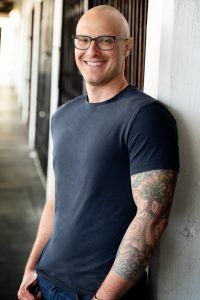
Today on Unleashed we are joined by Brad Stulberg. Brad is a coach, author, speaker and researcher whose work explores the principles of health, wellbeing, and mastery that transcend capabilities and domains. He’s learned that whether someone is trying to qualify for the Olympics, break ground in mathematical theory, launch a business, craft a creative masterpiece, or simply raise a family, many of the practices underlying sustainable success and wellbeing are the same; supported by scientific evidence; and available to everyone.
He regularly writes about those topics in his popular column Do It Better, in Outside Magazine, as well as essays and articles for other leading outlets such as The New York Times, Wired, New York Magazine, Sports Illustrated, and more. Brad has co-authored two books, The Passion Paradox and Peak Performance and he also hosts a terrific podcast called The Growth Equation.
The Growth Equation
Brad began by elaborating on his simple equation for growth:
STRESS + REST = GROWTH
Stress is a stimulus of some kind that resists our physical, intellectual or emotional movement; we must push against it. This then followed by a period of appropriate rest results in growth.
The most common experience people have with this is physical exercise. We put our bodies under stress by lifting weights or increasing pace of some movement or activity, and then follow that by a period of lesser movement or resistance. This generates muscle or cardiovascular growth. Brad suggests that same is true for mental growth, relationship growth and even growth of our organizations.
For us as human beings, Brad emphasised sleep. Study after study confirms that good sleep is not only needed for growth, but just for us to function. As Karen McNeill described in Episode 4 of Unleashed, sleep is critical in our overall resilience as leaders.
But isn’t rest what we do when we are not working? Brad suggested we need to reframe the way we think about leadership. Rest, sleep and all activities that promote our well-being are part of good leadership.
Good and Bad Passion
We’ve been taught to follow our passions and dreams, but Brad cautions that there are two types of passion: harmonious and obsessive. Harmonious passion is when we get enjoyment out of an activity, while obsessive is when the enjoyment is tied to the results or the external validation. In his work, Brad has discovered that those who pursue harmonious passions in life will be able to sustain the performance longer, even indefinitely, and are far less likely to burn-out.
It’s important to stay vigilant because sometimes what starts as a harmonious passion activity can later become obsessive. Once we get external success, notoriety, even fame, our motivation can shift to just chasing those accolades over having joy in the experience itself. We can guard against this by controlling our environment, reflecting on how our values align to our activities, and regularly taking time to review our priorities.
Rooted Leadership
Brad’s latest area of interest is in what he calls rooted leadership. It looks at resilience in a new way not as the ability to rebound from adversity, but rather stand-up and lean into the adversity. He likens it to a large tree that can withstand terrible storms because of the roots it has.
The Rooted Leadership model is built on six elements that, when combined, allow people to be strongly rooted and able to withstand significant amounts of stress and adversity. The elements are:
- Acceptance – knowing where you are, objectively talking stock, and seeking clarity in the facts. Not lying to yourself about your current reality.
- Presence – the ability to be “in the moment”, not looking back or forward, but being fully engaged in the current activity or with the people you are with.
- Patience – ability to play the long game, and to zoom out and see the big picture.
- Vulnerability – the skill of straight-talk and being able to get closer to saying what you are really feeling. Less performing in communication.
- Community – Redwood trees have shallow roots, but they overlap with the roots of other trees. A community of roots is what makes them strong. It’s similar for us; we are stronger if our roots interlock with others.
- Physical movement – there continues to be significant research showing that physical movement supports wellbeing.
There is so much more
Brad explored many other topics that are essential for us as leaders including the Hybrid Entrepreneur, responding to ‘bad days’, and one of his favourite phrases, “the path is the goal and the goal is the path.”
Take Your Business to the Next Level
At Results we care about your success, we understand how overwhelming it can feel to run a business, and we’re here to help. Reach out to Nicole through our contact form for ways to unleash the potential of your business.
Visit the Unleashed Podcast Library where you’ll find exclusive conversations with world-class thought leaders, authors, and leadership experts.
Each episode of Unleashed is hosted by Results’ CEO Jeff Tetz who spends most of his day exploring what makes high performers tick and helping build a community of leaders who want to learn and grow together. Follow Jeff (Twitter; LinkedIn; Instagram) for more great leadership insights.


